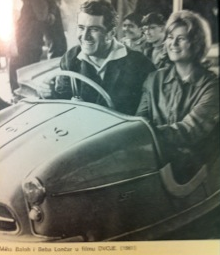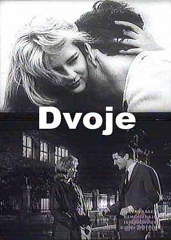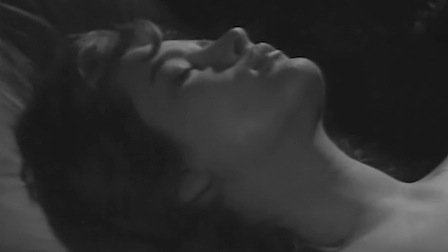(Two), original title Dvoje
This film marks the beginning of modern Yugoslavian film
The new european sensitivity of the 60s
| Production company: | Avala film, Beograd 1961 |
| Screenplay: | Aleksandar Petrović |
| Director: | Aleksandar Petrović |
| Art Director: | Miodrag Nikolić |
| Cinematography: | Ivan Marinček |
| Set Design: | Zoran Zorčić |
| Producer: | Zoran Zorčić |
| Film Editing: | Mirjana Mitić |
| Music: | Ljiljana Popović |
| Choice of Music: | Aleksandar Petrović |
| Cast: | Desanka Beba Lončar, Miha Baloh, Nada Kasapić, Branka Palčić, Borislav Radović, Dragan Vladić, Milos Žutić |
Plot Summary:
 A romantic encounter. Love. The end of a relationship and the death of a feeling.
A romantic encounter. Love. The end of a relationship and the death of a feeling.
Alexander Petrovic examines the chaos and romance of a couple in an intimate and poetic way. In this work he revolutionizes the language of cinematography.
Awards, honors, festivals:
This was Petrovic’s first fiction film. French and Italian critics at the Cannes Film Festival in 1962 said that this was also the first film with socialist cinematrography that, in its own way, corresponded with the cinematographic movement of the time (‘new wave’).
Press excerpts:
“We will find the best solution to problems in Alexander Petrovic’s When Love Has Gone, a film that is magnificiently deep and realistically personal. It’s the first yugoslav film (among those that I have seen) where the director reigns completely on the material of his work, he knows it so well that instead of looking for a more expressive filmed language, he accesses his creation and therefore expresses what he wants to, with richness and accuracy.” THE FILM OF TODAY – Donald Rich
“…We can attribute to Alexander Petrovic numerous pleasant discoveries, like the waltz that the two lovers dance in the street, taken away by the distant music, witnesses of a charming invention.
It is a film with no claims, which makes, at a moment when cinema is about reflexion, makes this artist appear like a man that has felt a very important thing.” Eugène Fabre, THE GENEVA JOURNAL 05/21/1962
“Yugoslavia has presented a film that we cannot avoid, When Love Has Gone by Alexander Petrovic, that, in the modern context of boredom and solitude, tells a love story that lives only one year, the lifespan of a goldfish. We do not know who is more miserable – him, who is fed up first or her, who is abandonned. Only tears at this festival!” Leo Pesteli LA STAMPA 05/19/1962
Michel Menso (L’Express, 05/24/1962) singles out the most interesting films at the Cannes Festival of 1962. He names Michelangelo Antonioni and Alain Resnais as two of the most interesting people in world cinema and suggests that When Love Has Gone is the result of the legacy that L’aventurra and Marienbad have left. There is inherently an error here because Alexander Petrovic could not have seen neither Marienbad, that was filmed at the same time as When Love Has Gone, not L’aventurra, that was only diffused in Yugoslavia after the end of the filming for When Love Has Gone.
Alexander Petrovic about When Love Has Gone (Dvoje):
I started with the fact that Art is Truth. I tried not to wander far from the truth of life, by showing the face of daily truth, discovering some truths about life and the existence of man.
The film does not aspire to dramatic situations but rather to an image of life. I do not make a film based on an actor, and not even on the person that he/she represents, but on an idea or an emotion. For me, it is essential that a movie today be sincere and true, a confession of some sort, the image of life seen from one’s own eyes, a part of the consciousness of modern man.
My documentary films are made with the principals of a fiction film, so When Love Has Gone has documentary elements. I have concluded that fiction films miss vitality, but the abstract and narrative aspect of fiction films are missing from documentary films.
One more thing: as time went by, I had many opportunities to analyze old photographs. Believe me, that is an easier way to learn about life than to observethe environment around us. To a certain point, I tried to make When Love Has Gone on the basis of the interactions between images of life and life itself.
My goal has never been to create something that has been preconceived but rather to express what I feel.
I always start from an experience that has touched and inspired me and I look for the solution in the materials that I use. One can literally transpose a subject (for example, when two lovers part); but one must subjectively live it for its’ rational construction to harmonise with it.
Eclisse’s insinuation:
“My films When Love Has Gone and Days were screened last year during my retrospective at La Rochelle (1986). During a very animated press conference, Marcel Martin asked me if these two films were filmed under the influence of Czech cinema, and if I had seen Czech films prior to filming (Forman, Passek etc.). I responded that I had not had the opportunity to see these films prior to filming because those Czech films had not yet been produced at that point in time. Those cinematographers could have possibly seen my films, but it was impossible for me to have seen theirs. Today, I don’t want to talk about whether they have seen my films or not. But it is certain that I could not have seen their films in 1961 (the year of the filming if When Love Has Gone) since their movies were filmed in 1963. This resembles the Antonioni story and the insinuation that When Love Has Gone was inspired by Eclisse (Eclipse). That film was also made later (1962)… And remember that the scenario for When Love Has Gone was written in 1959. A.P.








Leave a Reply
You must be logged in to post a comment.